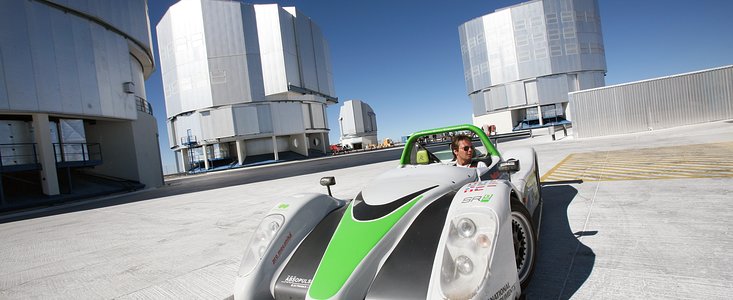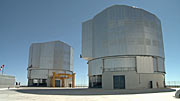Announcement
Electric Supercar on Pan-American Marathon Races to ESO’s Very Large Telescope
28 October 2010
The SRZero supercar, one of the most advanced electric vehicles ever created, sped to the European Southern Observatory’s Very Large Telescope on 27 October as part of its ambitious trek down the Americas. This was a remarkable meeting of two technological masterpieces that are both examples of the finest inventions that have taken humanity to the limits of the possible, both on this planet and beyond. Astronomers, journalists, engineers and other lucky guests enjoyed the extraordinary spectacle of this eco-friendly supercar revving around the four Unit Telescopes, bathed in glorious sunset light before the observatory domes opened to begin the night’s observations.
The SRZero electric supercar is a project carried out by students from the Racing Green Endurance (RGE) team from Imperial College London’s Energy Futures Lab, sponsored by KPMG and supported in Chile by the British Embassy. The 400-bhp twin-motor vehicle is touring the full 26 000 km length of the Pan-American Highway from Alaska's Prudhoe Bay, to Ushuaia, one of the southernmost cities in the world. This route is an immense challenge for road vehicles, and so is the perfect testbed to show how electric cars are every bit as capable as their conventional counterparts.
The European Southern Observatory (ESO) Very Large Telescope is the world’s most advanced visible-light astronomical observatory, and the flagship facility for European ground-based astronomy. It consists of four immense Unit Telescopes that allow astronomers to peer into the depths of the cosmos, revealing distant objects such as galaxies that are four billions times fainter than those which can be seen with the unaided eye.
“Visiting ESO’s Very Large Telescope was definitely a highlight of the expedition. We were very happy to see that ESO shares our enthusiasm for education, though in different areas, but after meeting the astronomers it became clear that we also have a common passion for adventure. While we experiment with new propulsion methods to push the boundaries of what can be achieved with electric vehicles, they use advanced technology to explore the Universe and reach new heights in astronomy,” said Alexander Schey, Racing Green Endurance Project Manager.
Sustainability is essential for astronomers living and working at Paranal Observatory, home to the Very Large Telescope. In the forbidding desert environment, virtually nothing can grow outside. The humidity drops below 10 percent, there are intense ultraviolet rays from the Sun, and the high altitude leaves people short of breath. To allow the scientists some respite, they stay in a modern hotel called the Residencia. This award-winning construction was designed by German architects Auer+Weber as a subterranean L-shape, with a 35-metre dome covering an indoor garden. The use of natural materials and colours means that the Residencia blends smoothly into the Atacama’s landscape. Its futuristic looks landed it a role as a villain’s hideout in the recent James Bond film Quantum of Solace!
More information
ESO, the European Southern Observatory, is the foremost intergovernmental astronomy organisation in Europe and the world’s most productive astronomical observatory. It is supported by 14 countries: Austria, Belgium, Czechia, Denmark, France, Finland, Germany, Italy, the Netherlands, Portugal, Spain, Sweden, Switzerland and the United Kingdom. ESO carries out an ambitious programme focused on the design, construction and operation of powerful ground-based observing facilities enabling astronomers to make important scientific discoveries. ESO also plays a leading role in promoting and organising cooperation in astronomical research. ESO operates three unique world-class observing sites in Chile: La Silla, Paranal and Chajnantor. At Paranal, ESO operates the Very Large Telescope, the world’s most advanced visible-light astronomical observatory and VISTA, the world’s largest survey telescope. ESO is the European partner of a revolutionary astronomical telescope ALMA, the largest astronomical project in existence. ESO is currently planning a 42-metre European Extremely Large optical/near-infrared Telescope, the E-ELT, which will become “the world’s biggest eye on the sky”.
The international firm KPMG is the main sponsor of the RGE project. In Chile, KPMG and the British Embassy have carefully followed the vehicle since its arrival in the Americas, working together to make sure that the project has the greatest impact possible in the country. Both KPMG and the British Embassy in Chile are proud to introduce to the local community a vehicle that presents sustainable features and breakthrough technology in line with the significant advances made in the country during recent years.
Links
Contacts
Gonzalo Argandona
ESO Santiago Office
Phone: +56 2 463.3258
E-mail: gargando@eso.org
Oana Sandu
ESO, Garching, Germany
Community and Outreach Support
Phone: +49 89 3200 6965
E-mail: osandu@eso.org
About the Announcement
| Id: | ann1079 |
Our use of Cookies
We use cookies that are essential for accessing our websites and using our services. We also use cookies to analyse, measure and improve our websites’ performance, to enable content sharing via social media and to display media content hosted on third-party platforms.
ESO Cookies Policy
The European Organisation for Astronomical Research in the Southern Hemisphere (ESO) is the pre-eminent intergovernmental science and technology organisation in astronomy. It carries out an ambitious programme focused on the design, construction and operation of powerful ground-based observing facilities for astronomy.
This Cookies Policy is intended to provide clarity by outlining the cookies used on the ESO public websites, their functions, the options you have for controlling them, and the ways you can contact us for additional details.
What are cookies?
Cookies are small pieces of data stored on your device by websites you visit. They serve various purposes, such as remembering login credentials and preferences and enhance your browsing experience.
Categories of cookies we use
Essential cookies (always active): These cookies are strictly necessary for the proper functioning of our website. Without these cookies, the website cannot operate correctly, and certain services, such as logging in or accessing secure areas, may not be available; because they are essential for the website’s operation, they cannot be disabled.
Functional Cookies: These cookies enhance your browsing experience by enabling additional features and personalization, such as remembering your preferences and settings. While not strictly necessary for the website to function, they improve usability and convenience; these cookies are only placed if you provide your consent.
Analytics cookies: These cookies collect information about how visitors interact with our website, such as which pages are visited most often and how users navigate the site. This data helps us improve website performance, optimize content, and enhance the user experience; these cookies are only placed if you provide your consent. We use the following analytics cookies.
Matomo Cookies:
This website uses Matomo (formerly Piwik), an open source software which enables the statistical analysis of website visits. Matomo uses cookies (text files) which are saved on your computer and which allow us to analyze how you use our website. The website user information generated by the cookies will only be saved on the servers of our IT Department. We use this information to analyze www.eso.org visits and to prepare reports on website activities. These data will not be disclosed to third parties.
On behalf of ESO, Matomo will use this information for the purpose of evaluating your use of the website, compiling reports on website activity and providing other services relating to website activity and internet usage.
Matomo cookies settings:
Additional Third-party cookies on ESO websites: some of our pages display content from external providers, e.g. YouTube.
Such third-party services are outside of ESO control and may, at any time, change their terms of service, use of cookies, etc.
YouTube: Some videos on the ESO website are embedded from ESO’s official YouTube channel. We have enabled YouTube’s privacy-enhanced mode, meaning that no cookies are set unless the user actively clicks on the video to play it. Additionally, in this mode, YouTube does not store any personally identifiable cookie data for embedded video playbacks. For more details, please refer to YouTube’s embedding videos information page.
Cookies can also be classified based on the following elements.
Regarding the domain, there are:
- First-party cookies, set by the website you are currently visiting. They are stored by the same domain that you are browsing and are used to enhance your experience on that site;
- Third-party cookies, set by a domain other than the one you are currently visiting.
As for their duration, cookies can be:
- Browser-session cookies, which are deleted when the user closes the browser;
- Stored cookies, which stay on the user's device for a predetermined period of time.
How to manage cookies
Cookie settings: You can modify your cookie choices for the ESO webpages at any time by clicking on the link Cookie settings at the bottom of any page.
In your browser: If you wish to delete cookies or instruct your browser to delete or block cookies by default, please visit the help pages of your browser:
Please be aware that if you delete or decline cookies, certain functionalities of our website may be not be available and your browsing experience may be affected.
You can set most browsers to prevent any cookies being placed on your device, but you may then have to manually adjust some preferences every time you visit a site/page. And some services and functionalities may not work properly at all (e.g. profile logging-in, shop check out).
Updates to the ESO Cookies Policy
The ESO Cookies Policy may be subject to future updates, which will be made available on this page.
Additional information
For any queries related to cookies, please contact: pdprATesoDOTorg.
As ESO public webpages are managed by our Department of Communication, your questions will be dealt with the support of the said Department.


